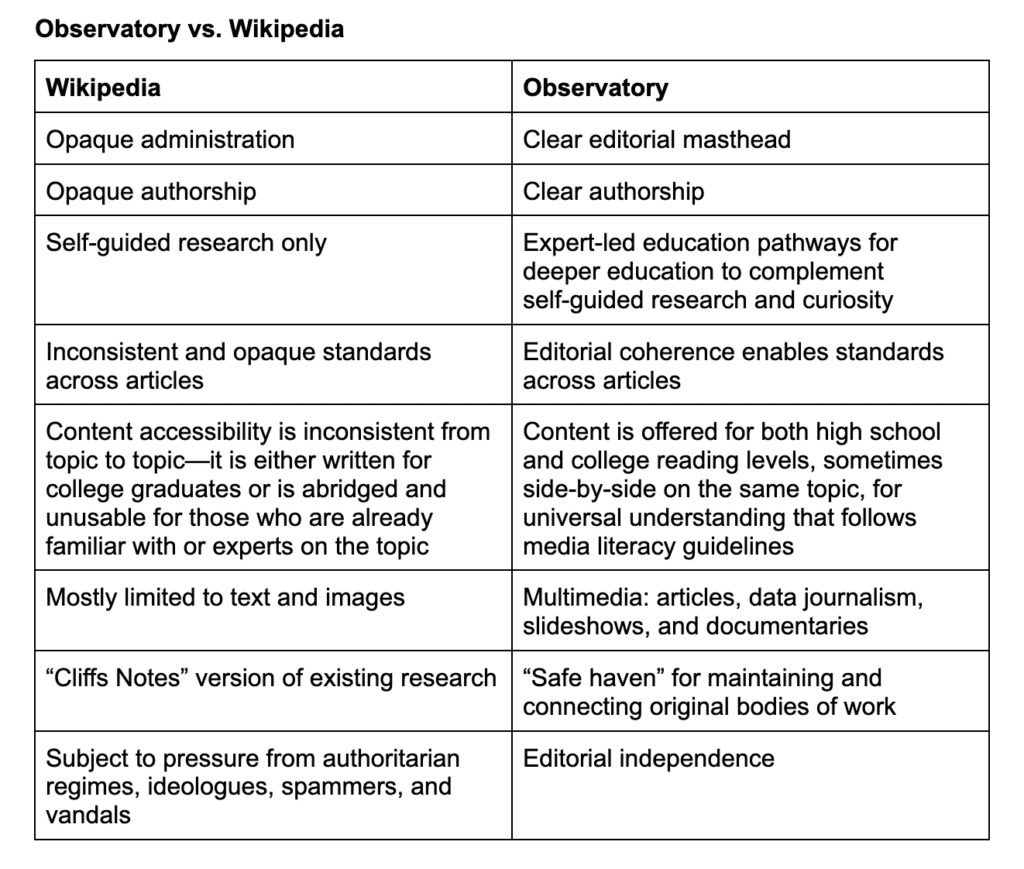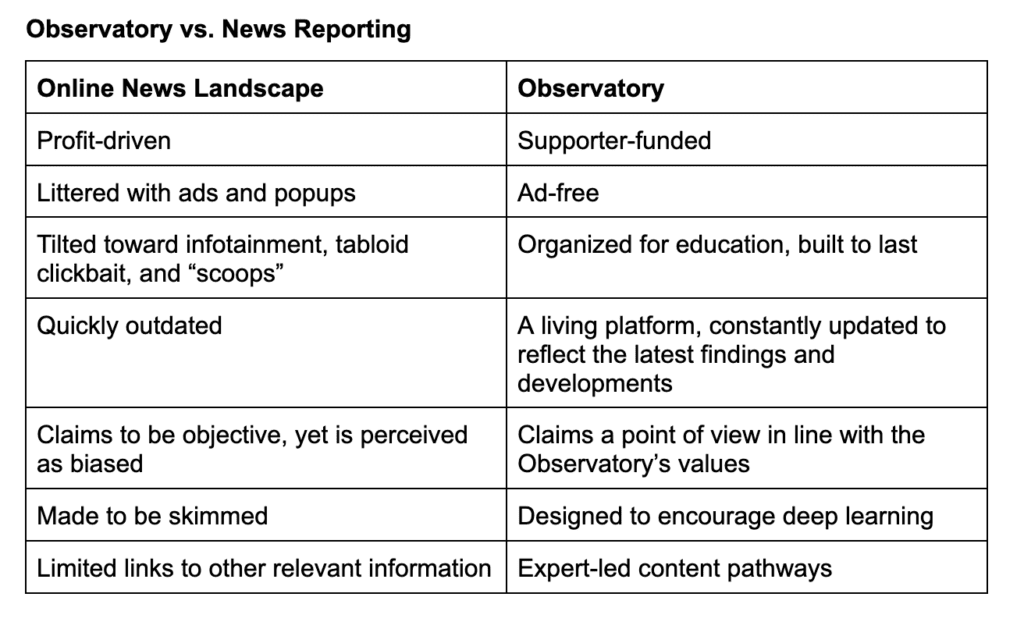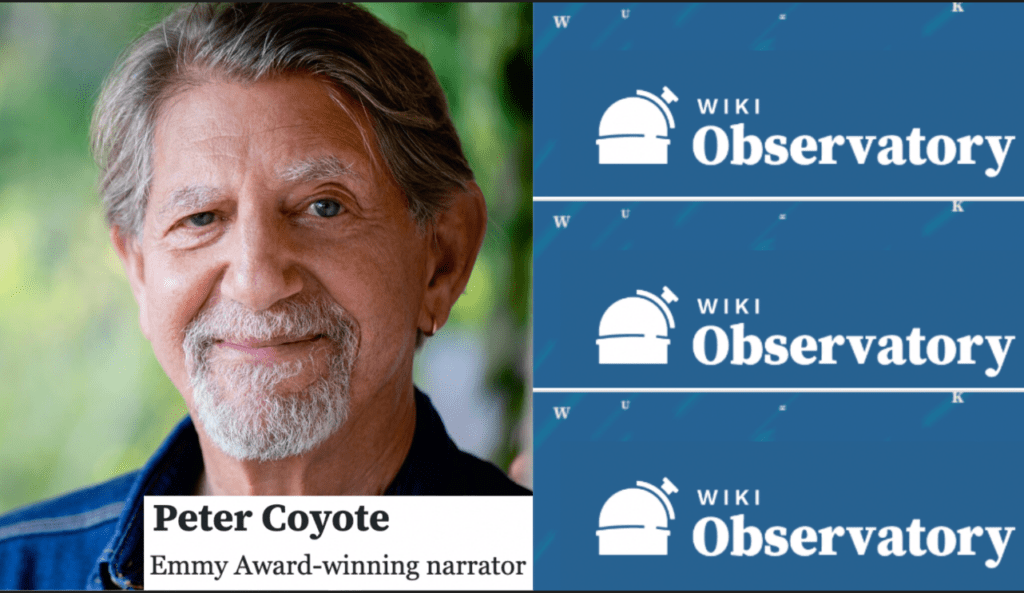A message from Peter Coyote:
If you’re like me, you probably have some trust issues with the media, whether it’s news from the internet or what’s on TV. It’s a problem because we all need to learn about the issues of our times from trustworthy and respected experts.
And we all have day-to-day information needs in our personal life. Where do you go for that?
The Observatory is a promising solution. It’s a free public education resource and reference guide to understand today’s issues and navigate life in the modern world.
Already, hundreds of trusted experts and researchers are proud to share their expertise with the public through the Observatory and make it accessible and understandable for everyone. It’s already an incredible resource, but it will take years to reach its full potential.
And that’s where you come in. The Observatory should never have to worry about keeping the lights on. It’s already a valuable asset to the public and has great long-term potential to be a trusted resource the public needs.
Please explore the Observatory and support this important project. I’m sure you’ll agree that we need this.
Thanks,
Peter Coyote
Note from the Observatory founders:
The Observatory is a free digital education resource. It offers the public useful information to help them better understand today’s issues and navigate life in the modern world.
Visitors engage with the Observatory:
- Via Search: For expertise by keyword, topic area, or a favorite author.
- Via Guides: To get the big picture.
The Observatory uses MediaWiki, the software that powers Wikipedia, to publish content by a team of expert contributors.
Our doors are open: The Observatory is designed to incorporate reader feedback and is open to input and collaboration with volunteer researchers and editors.
Our goal is to be an audience-supported education resource that can make a difference.
Please visit the Observatory and donate now or schedule a call or video meeting with the Observatory founders to learn more and share your interest.
Background:
The Observatory is a free online encyclopedia written by experts and journalists. It was produced through collaborative peer review and editorial oversight. The encyclopedia explores key social and political issues to help readers navigate modern life.
In an era of declining trust in news, the Observatory fosters deeper reader engagement through well-researched and accessible content. It is a growing hub for informed public education, featuring contributions from leading intellectuals, academics, and journalists. New articles are added weekly, expanding its reach on critical topics.
Experts contribute original research and curated insights, drawn to the Observatory’s high-quality editorial process and Creative Commons accessibility. Built on Wikimedia Foundation software, it offers advanced search tools, expert-guided learning pathways, and multimedia content—ensuring a scalable and cost-effective platform.
Online News Trust
The news media industry has undergone significant changes in recent years. First, how people consume news has shifted dramatically compared to 10 or 20 years ago. Online news consumption has surpassed television, becoming the primary source of information for many. Second, the industry’s business model has evolved, with many news organizations relying more on digital ad revenue to sustain their operations.
Third, political identity plays a significant role in media trust as political parties tend to trust different news sources. Finally, misinformation has become a serious challenge. Many people struggle to navigate online news in an era of widespread false information, and many believe that fabricated news causes confusion and poses a significant societal problem.
Reader trust in digital news is below 20 percent (Gallup). The online news landscape fosters low attention spans and high skepticism. It is cluttered with ads, paywalls, and popups, hindering deep learning and open-minded discussion. Comparing authoritative perspectives or filtering misinformation is equally challenging.
Wikipedia’s Trust Advantage Over Online News
A 2019 YouGov poll found 78 to 98 percent of respondents across five countries trusted Wikipedia. This highlights the potential for alternative information models focused on public education.
Pew Research (2020) found that users spend 1.82 minutes per newspaper site visit, while Similarweb data shows that Wikipedia visits average nearly 4 minutes. The Observatory aims to extend engagement further through documentaries and podcasts.
Challenges for Experts in Digital Media
Experts struggle to educate audiences in a fragmented online environment for numerous reasons:
- Their work is scattered, buried by algorithms, or locked behind paywalls.
- Definitive research quickly becomes outdated.
- Academic content is inaccessible to many readers.
- To compete with infotainment, experts tend to oversimplify or sensationalize.
By offering a dedicated, ad-free platform, the Observatory helps experts engage the public without compromising on the depth or accuracy of their work.
Please visit the Observatory and donate now or schedule a call or video meeting with the Observatory founders to learn more and share your interest.


What Makes the Observatory Special?
Built for Learning
The Observatory contextualizes and clarifies pressing social and political issues, fostering deeper engagement through high-quality writing and editing. Wiki software enables guided exploration, linking articles, data journalism, and multimedia content. All content is available at high school and college reading levels, following media literacy guidelines.
Clear Authorship and Accountability
Unlike Wikipedia, which uses anonymous crowd-editing, the Observatory relies on invited experts and a dedicated editorial team, ensuring transparency and credibility. While Wikipedia battles unseen influences—self-interested figures, regimes, and spammers—the Observatory upholds editorial integrity and trustworthiness.
Beyond News and Academia
News outlets prioritize quick cycles, while academic journals remain static. The Observatory offers a living repository, is continually updated with the latest research, and is free from ad-driven pressures. Unlike Wikipedia, it combines agility with editorial coherence to keep content relevant and insightful.
A Unique Publishing Model
While online news is oversaturated, reference sites face little competition. Wikipedia’s model relies on a small group of editors controlling 80 percent of the content, often behind opaque moderation. The Observatory revives the expert-driven tradition of encyclopedias, offering authoritative and well-curated information.
Designed around a world-class wiki search tool, the Observatory is a trusted entry point for inquiry and learning.
You can donate now or schedule a call or video meeting to learn more and share your interest with Jan Ritch-Frel and the founders.
